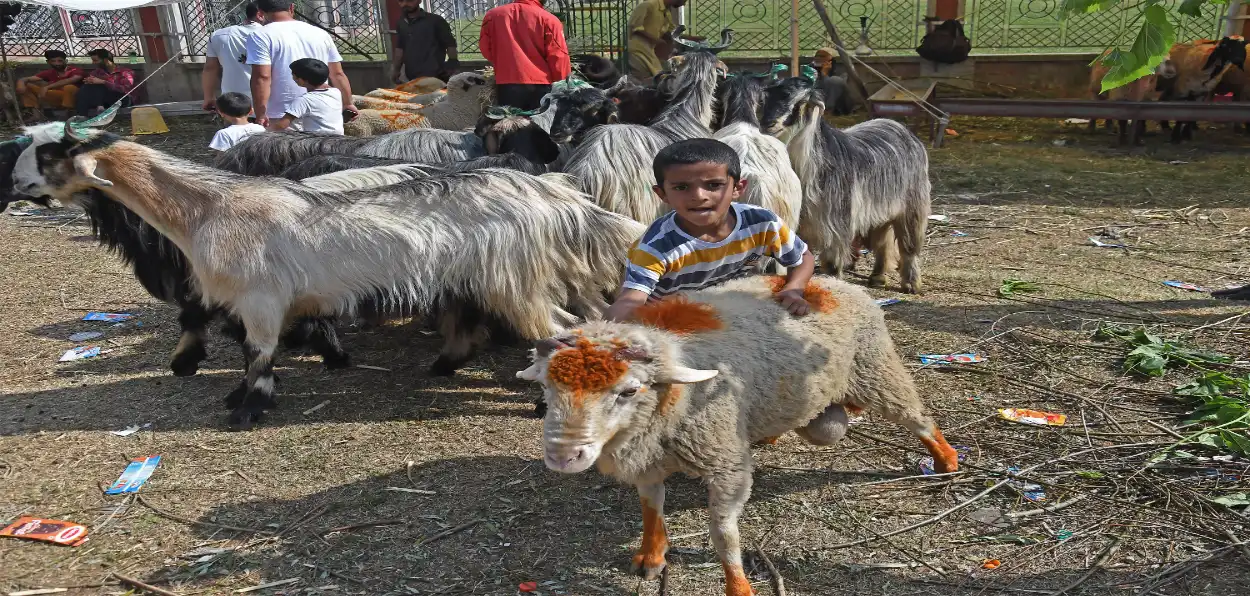
Sayyed Taleef Haider
Two Eids are related to two pillars of Islam in the Muslim religious doctrine. The first, Eid al-Fitr, is celebrated after 30 days of fasting during Ramazan, and the second is on the occasion of Hajj. Eid-ul-Adha is also known as the Badi Eid, during which Muslims from all over the world perform Qurbani of animals and Hajj.
Although the tradition of Eid ul-Adha was not practiced before the time of Prophet Mohammad, the historical basis for this Eid is the incident in which Hazrat Ibrahim attempted to perform Qurbani on Hazrat Ismail for Allah as an interpretation of his dream.
He also sacrificed Hazrat Ismail to Allah, who accepted his sacrifice but substituted a sheep for Ismail. Prophet Mohammad commanded regular Muslims to perform Qurbani on this occasion in order to share this incident among Muslims and to remember it eternally. The Prophet used to do Qurbani. This is a Ba'himat-ul Ana'am (Bovine, Camels, Goats, Sheep, etc.) Qurbani. However, the true objective of this Qurbani is not to butcher a goat, buffalo, sheep, or camel, but to acquire piety. The Qur'an contains the following verse:
Never does their flesh nor their blood reach Allah, but your piety successfully reaches Him [22:37,]
In light of this passage, we must consider how much of one's piety is involved in sacrificing an animal on the occasion of Eid. It is acknowledged that Qurbani is not mandatory. It is Wajib according to the Ahanaaf, and Sunnah according to the Shavafay and Malikis. But, in this situation, have Muslims forgotten about Farz? Why do they readily adopt Wajib or Sunnah to demonstrate their piety?
During Eid ul-Adha, I have observed that Muslims are so devout in general that they consider executing this Wajib act as Farz after performing all other Faraiz. Are we carrying out our responsibilities as Muslims? Are we looking after our neighbours, country, relatives, and friends? Do we understand the impact that slaughtering animals for Qurbani has on our neighbours? Indeed, Qurbani is a magnificent act. But that act is only valid when we perform it with seriousness rather than for show-off or meat-eating and enjoyment, before this act, we consider the activities that are more significant than Qurbani.
Eid ul-Adha celebrations in different towns in India have practically appeared alike to me. The situation is the same in Muslim areas of Mumbai, Gujarat, Delhi, and Uttar Pradesh also. On the day of Qurbani, there is blood everywhere: dead animals' meat, their skins on the road, entrails and udders on the markets, square junctions, and crimson water flowing like blood in the drains. Is this the true aim of Qurbani, or do we consider why we are doing this and what its objective is before Qurbani?
On one side, Muslims are standing in a queue outside mosques and graveyards, not receiving even a single meal, and on the other, Muslims are conducting Qurbani of 25 to 30 goats for display. They are spreading their meat among relatives rather than the destitute. The Qurbani meat is preserved in refrigerators for eight days in well-off Muslim houses before being consumed, even though many starving and destitute individuals do not see a plate full of food. We frequently forget that Qurbani is an act of worship, not a festival. There is no difference between eating meat from a butcher's shop on regular days and eating Qurbani meat in the same way. Except you're chopping meat and seeking assistance from the same butcher on your house's roof and door or in an open field instead of the butcher's shop. Furthermore, the soil was thrown outside on the street.
The goal of Qurbani is to instil in us the belief that our actions are pure for Allah, who sees us all the time. If Allah is watching you, it means He is monitoring you even before the Qurbani, and He is also observing your daily life and every action in which you are not taking care of your tasks, your neighbourhood, your city, and your country, as well as yourself. The Qurbani ceremony is an Abrahamic rite that taught us to sacrifice our most treasured possessions for Allah.
Can every Muslim who performs Qurbani on any animal guarantee that the animal he is sacrificing is the most important thing he wishes to Qurban for Allah? I believe we all know the answer. If we have to give up anything as Indian Muslims today, it is our false ego of religious superiority. We must make sacrifices to improve ourselves and become responsible members of our community, city, and country. Our abilities can be put to use to help it grow.
ALSO READ: Sacrifice has to be done with full etiquettes as it is not a show-off
We should learn to make sacrifices in the field of education to become capable while also creating a separate identity for ourselves; the sacrifice of being a hardworking person in any situation is better than any sacrifice. This sacrifice will enhance the beauty of our world in the future.
